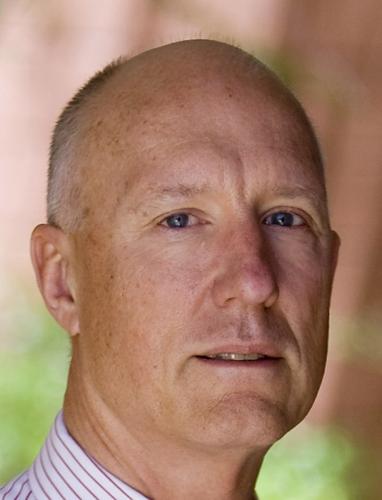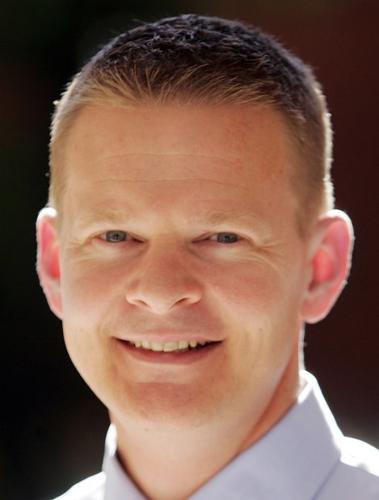Dr. Bruce Parks is retiring after 20 years as the Pima County chief medical examiner.
Known for his compassion and fairness, Parks helped guide the office through a tumultuous past decade in which the staff handled the bodies of more than 1,700 illegal border crossers recovered in Arizona's desert.
His kind face and soft-spoken voice became synonymous with the ongoing issue of border deaths. He did hundreds of interviews with English and Spanish language media over the last decade, making the 55-year-old doctor well known nationally and internationally.
"We treat people like we would want our family members to be treated," said Parks about dealing with illegal border crossers, in what became the office's mantra.
Dr. Gregory Hess will replace Parks. The Wisconsin native and former Air Force flight surgeon joined the office nearly four years ago and takes over officially on Friday.
Despite illegal immigration being a polarizing issue, Parks shielded the office from the politics, said Bruce Anderson, the office's forensic anthropologist.
Parks instructed the staff to go the extra mile to identify any person who came in unidentified - regardless of whether it was a U.S. citizen or foreigner, Anderson said.
"He said, 'These people are dead, they are in jurisdiction and we need to do what it takes to get them identified,'" said Anderson, who's known Parks since the mid-1980s. "He deserves as lot of the credit for the success we've had over the last decade on this migrant issue."
"It's his personality to be fair," Anderson said. "If he's nothing else, he's fair."
Parks has been instrumental in telling the truth to the nation and world about the onslaught of border crosser deaths in undeniable medical terms, said Kat Rodriguez, program director for the Tucson-based Coalición de Derechos Humanos. Rodriguez and Derechos Humanos works closely with the medical examiner in fielding calls of missing persons.
"He's been a kind and compassionate man that has talked about these issues from the perspective of a human being," Rodriguez said.
Not all medical examiner's offices handle illegal border crosser deaths with the same compassion and dedication as Pima County, said Rodriguez, who's interviewed 25 Southwest border medical examiners.
"They're overwhelmed and yet he's kept the human perspective constantly in focus," Rodriguez said.
Parks was 35 years old when he was thrust into the chief medical examiner position in 1991 after then medical examiner, Dr. Allen Jones, committed suicide. Dr. Thomas Henry, the chief deputy medical examiner, had recently left to become medical examiner in Denver.
Parks, who had joined the office five years earlier, was the only pathologist left.
"It was never a goal of mine to become chief medical examiner, it was not part of my life plan," Parks said. "It just happened."
Parks was always honest, professional, calm and collected during a "fabulous" tenure, said Pima County Administrator Chuck Huckelberry.
"I'll miss him," Huckelberry said. "He's done a great job for the taxpayers. He's operated the office efficiently and effectively."
The low point in Parks' tenure came in 2000 when Parks was reprimanded and ordered to get counseling after a county investigation found he failed to control sexual harassment and inappropriate behavior by others at the office, according to Arizona Daily Star archives.
Under Park's guidance, the office doubled in size and became the experts on how to handle the difficult and harrowing cases of illegal border crossers.
"I think that is probably going to define my years here, maybe more than anything, because of the attention this office has received because of that," Parks said. "Who knows how much longer it's going to continue?"
Hess said he has no plans to change the way the office handles the illegal border crossers.
His priorities will be to continue modernizing the office, including getting national accreditation and bringing the staff's death investigation system up to date. For example, he hopes to be able to send investigators to all death scenes. Currently, they only go to some.
"I'm not trying to say that Dr. Parks was unmodern or necessarily been doing it wrong," Hess said. "But like everything, things tend to change over time and we are trying to make sure we are staying up with the changes."
Hess was an easy choice for the position, Huckelberry said. He's a skilled doctor and part of a new generation of medical examiners, he said. He has great management skills, perhaps due to his military background, Huckelberry said.
"I hope he has a long, bright future with us," Huckelberry said. "We have been fortunate to have had a very good medical examiner in Bruce Parks and in my view, we are going to have one just as good."
Parks won't miss the stress and responsibility of the position - "20 years is a long time in this position," he said. But he'll miss the staff and the rewarding feeling of determining how a person died.
"I always like to think of our work as hopefully making a bad situation better," Parks said.
If a part-time pathologist position opens at the office, he said he'll consider coming back. And he said he'll probably work part time at the University of Arizona's pathology department.
But for the time being, he's looking forward to relaxing and getting projects done around the house and spending more time on his bicycle. He's an avid cyclist and will now have more time for rides.
He may also fix up a 1965 Mustang that's been in the family for decades and take guitar lessons. And they'll be plenty of time for his addiction: Sudoku.
"I like the real hard puzzles," Parks said. "Sometimes they take me a couple of hours to finish one puzzle."
Contact reporter Brady McCombs at 573-4213 or bmccombs@azstarnet.com






